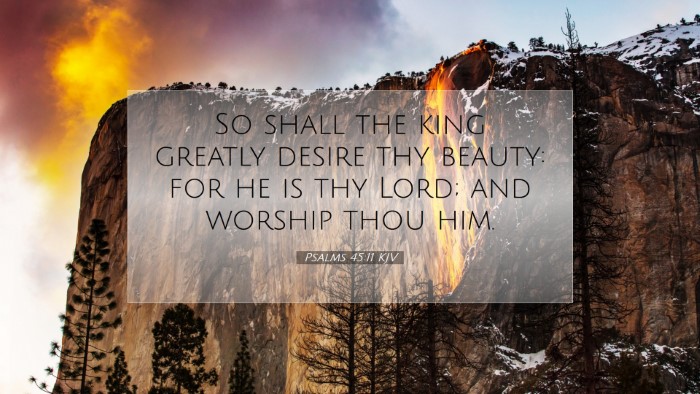Bible Commentary on Psalms 45:11
Verse: "So shall the king greatly desire thy beauty: for he is thy Lord; and worship thou him."
Introduction
This verse is a profound declaration of the relationship between the king and the bride, which symbolizes the relationship between Christ and His Church. The imagery of kingship, beauty, and worship leads us to reflect on the nature of divine love and the response it invites from humanity.
Commentary from Matthew Henry
Matthew Henry elaborates on the affectionate desire of the king towards the bride, interpreting this as a reflection of Christ’s desire for His people. The beauty referred to here is not merely physical but encompasses spiritual attractiveness. The king's longing for beauty can be understood as God’s desire for His Church to be adorned with holiness and righteousness.
Henry emphasizes that the beauty of the Church lies in the grace of God. He notes that the church should strive to be what the king desires, reflecting his attributes in their lives. This verse highlights the mutual relationship of love, wherein the bride (the Church) is called to respond to the king's (Christ's) affection with worship and submission.
Insights from Albert Barnes
Albert Barnes presents an analysis of the phrase "greatly desire." He contends that this indicates not only a mild interest but an intense longing. This language suggests that the beauty of the believer is of great importance; it indicates how God values His people. The emphasis on beauty is a reminder that the relationship with God is not trivial but is filled with significant worth and ardent desire.
Barnes identifies the "king" as a prefigurement of Christ, who seeks His followers to exemplify faith, holiness, and devotion. The instruction to “worship thou him” can be seen not just as a directive for the individual believer but as a corporate call to the Church to honor God in all aspects of life. This worship is both a recognition of His lordship and an acknowledgment of His desire for a relationship built on grace.
Reflections by Adam Clarke
Adam Clarke's commentary emphasizes the dual aspect of beauty – outward and inward. He notes that the king's desire for the beauty of the bride speaks to the Church's mission to be an embodiment of Christ's love and grace. Clarke asserts that worship should stem from an understanding of one's own value in the sight of God, reflecting a heart aligned with the king's values.
Clarke also draws attention to the imperative nature of the worship that is commanded. Worshiping God involves recognizing His lordship and embracing the call to live in accordance with His will. This submission is rooted in a deep understanding of who God is and, therefore, should provoke an appropriate, reverent response from His followers.
Theological Implications
The beauty that is spoken of in this verse transcends physicality and delves into moral and spiritual dimensions. Theological discussions around this verse often highlight the concept of beauty in the context of sin and redemption. The Church is seen as being transformed into a new creation that embodies the beauty that God desires.
- The Nature of Divine Desire: God’s desire for His people showcases His love and commitment, prompting theological reflections on divine election and grace.
- Worship as a Response: The call to worship signifies that beauty and worth are recognized in acknowledging God's lordship. This aspect connects with reformed thoughts on the ultimate purpose of humanity – to glorify God.
Conclusion
Psalms 45:11 masterfully encapsulates a Christological perspective of the relationship between God and His people. The desire of the king for beauty and the command to worship reveals profound truths about the nature of God’s love, the transformation He intends for His Church, and the appropriate response of gratitude and reverence.
For pastors, students, and theologians, this verse serves as a poignant reminder of the beauty of belonging to a God who passionately desires relationship, urging us to reflect that beauty in our lives through worship and devotion.


